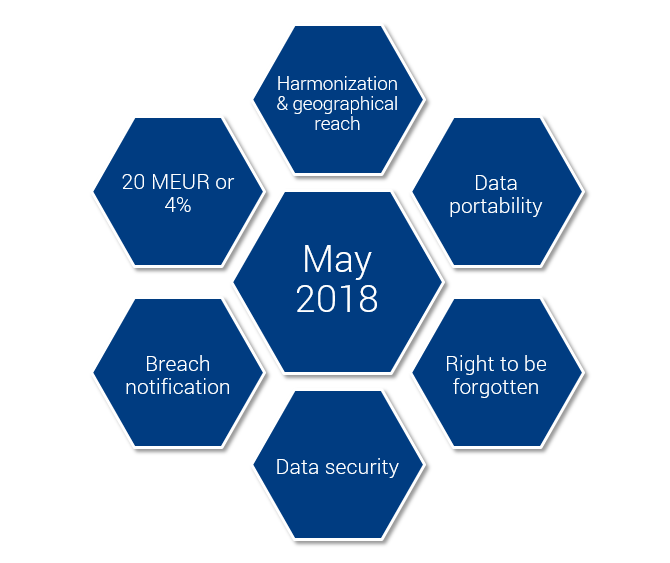The General Data Protection Regulation aims to strengthen the protection of personal data. The current data legislation dates back to 1995 with the Data Protection Directive which has a lack of harmony and has not evolved to deal with the current uses for Data eg marketing. The principles remain the same but the new policy is meant to update standards to fit today’s technology which has changed dramatically since 1995. Today, there are 3 billion internet users compared to 16 million 20 years ago, with the rise of social networks. The GDPR affects all businesses operating within the EU: EU Companies that process personal data, Non-EU companies who offer goods or services to individuals in the EU and Non-EU companies who monitor individual’s behaviour that takes place in the EU. It will come in effect on May 25th 2018 and we have to make these changes now to ensure that we are compliant.
MAIN CHANGES :
- CONSENT : Permission and consent are required to send marketing information. The consent must be unambiguous, informed and freely given. Prior to giving consent, data subjects (individuals whom particular personal data is about) must be informed of the right to withdraw consent at any time and it must be easy for them to do so. For children under 16, a parent or guardian must give his approval.
- RIGHTS FOR DATA SUBJECTS : Right to be informed, Right to access, Right to rectification, Right to erasure, Right to restrict processing, Right to data portability, Right to object, Rights in relation to automated decision making.
- DATA BREACHES : for example the destruction, loss, alteration, unauthorised disclosure of or access to personal data, human error. New mandatory obligation to notify data breaches to the regulator ASAP but not later than 72 hours and if notification is not made after 72 hours a reasoned justification is needed.
- ADMINISTRATIVE FINES AND COMPENSATION : Under the GDPR, data subjects will have a right to sue and recover material or non-material damages, e.g. loss of personal data, damage to reputation, loss of confidentiality. The current maximum fines are €3000 but GDPR fines are up to €20 million or 4% of the Turnover.
- INCREASED TERRITORIAL SCOPE : The policy applies to all companies processing the data of E.U. subjects , regardless of the company’s location.
- PRIVACY BY DESIGN : Data protection has to be included in the initial system design rather than added later.

KEY ACTIONS TO BE TAKEN
1/ AUDIT :
- You are required to document what personal data you hold, where it came from and who you share it with.
- It is recommended to conduct an information audit across the organisation or within particular business areas which need to be GDPR compliant.
2/ IDENTIFICATION :
- You should check your procedures to ensure they cover all the rights individuals have, including how you would delete personal data or provide data electronically and in common used format.
- You should identify the lawful basis for your processing activity in the GDPR, document it and update your notices.
3/ UPDATE DATA PROTECTION POLICY :
- You should update your procedure for dealing with subject requests to handle them within the new timescales;
- You should review how to seek, record and manage consent and whether you need to make any changes.
- You should also put a system in place to verify individuals’ age and to obtain parental or guardian consent for any data processing activity.
- Finally you should make sure you have the right procedures in place to detect, report and investigate a personal data breach.
4/ UPDATE PRIVACY NOTICES :
- After updating the data protection policy, it is important to review your current privacy notices and put a plan in place for making any necessary changes in time for GDPR implementation.
- They have to be concise and in an easy-to-read format with limited legalese.
- They must include : identity and contact details of the controller and the Data Protection Officer; purposes and legal basis for the processing; recipients of the personal data; retention periods; details on the right to access to personal data and rectification or deletion of it; right to withdraw consent; …
5/ UPDATE CONTRACTS WITH PROCESSOR AND CONTROLLERS : the contracts must set out :
- The subject matter and duration of the processing
- The nature and purpose of the processing
- The type of personal data and categories of data subject
- The obligations and rights of the controller
6/ CONSIDER AN APPOINTMENT WITH A DPO :
You should designate someone to take responsibility for data protection compliance and assess where this role will sit within your organisation’s structure. A Data Protection Officer can be outsourced to assist you in managing your organisation on its journey to becoming GDPR compliant . If your organisation operates in more than one EU member state, you should determine your lead data protection supervisory authority.
7/TRAINING :
- You should ensure that everybody is aware that the law is changing to the GDPR (mostly decision makers and key people) so they can start identifying areas that could cause compliance issues.
- You then have to train relevant staff and teach them how GDPR affects their role.
WHAT PROCUREMENT TEAMS SHOULD DO
Map the flow of personal data through supply chains. Identify recipients of personal data, including sub-processors. Note where and how the personal data is processed.
Identify existing supplier contracts that involve the processing of personal data and review the data protection provisions.
Consider the organisation’s approach to risk with existing and new contracts in relation to GDPR compliance. The financial risks posed by the regulation may change the risk profile of data processing contracts, necessitating a different approach Not sure what was meant here?? and data security breaches.
Carry out adequate due diligence on new suppliers to check their GDPR compliance, obtain guarantees regarding the measures that suppliers have in place and ensure there are rights of audit within the contract together with the other mandated data processing provisions.
Check whether existing insurance policies will cover data protection and security breaches including breaches by suppliers.
Check internal systems to ensure that processes are in place to enable the organisation to satisfy the 72-hour breach notification requirement.
USEFUL GDPR LINKS
For more information : https://ico.org.uk/for-organisations/guide-to-the-general-data-protection-regulation-gdpr/ OR https://gdprandyou.ie/organisations
Are you ready for GDPR ? make sure you have not forgotten anything thanks to this MCQ
You can also consult the Irish Data Protection Authority website.
Pixalert can help you by providing a software which locates all credit card data and critical data in your network to be GDPR compliant.
To assist you on how to get started and what GDPR means to your business, ISME Skillnet have designed GDPR Preparation training sessions called GDPR Essentials for SMEs specifically aimed at SMEs and business owners.
The first session in this series on Thursday, 15th February in the Clayton Hotel, Liffey Valley, Dublin is already booked out.
Additional sessions will take places in:
The Dun Library, Royal College of Physicians, 6 Kildare Street, Dublin on Wednesday 21st February
Clayton Hotel, Silver Springs, Tivoli, Cork on Tuesday, 6th March
Limerick Strand Hotel, Ennis Road, Limerick on Wednesday 7th March


